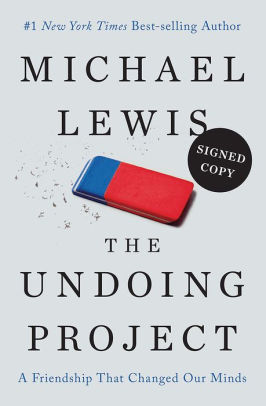The Undoing Project by Michael Lewis
By Eric Antoine Scuccimarra I have always been fascinated by the various ways in which our minds fail us. While we think we are very good at making decisions based on data and evidence, in fact we tend to use heuristics, or rules of thumbs, to come to quick and easy decisions when there is uncertainty involved. Daniel Kahneman and Amos Tversky pioneered research into this field and discovered what they call "cognitive biases" which are systematic deviations from making rational decisions and judgments. I first heard about these many years ago, specifically about how the anchoring bias was used in marketing. As the years have gone by I've become more and more interested in the subject.
I have always been fascinated by the various ways in which our minds fail us. While we think we are very good at making decisions based on data and evidence, in fact we tend to use heuristics, or rules of thumbs, to come to quick and easy decisions when there is uncertainty involved. Daniel Kahneman and Amos Tversky pioneered research into this field and discovered what they call "cognitive biases" which are systematic deviations from making rational decisions and judgments. I first heard about these many years ago, specifically about how the anchoring bias was used in marketing. As the years have gone by I've become more and more interested in the subject.
One cognitive bias you may have heard of is the "confirmation bias" which is where you interpret new information in such a way as to uphold your existing beliefs. This is why it is so hard to convince anyone that their opinion is wrong. When we hear information that contradicts our beliefs we tend to either dismiss it or rationalize it away. This is how Trump supporters can dismiss negative news as "fake news" and Clinton supporters can dismiss any of her scandals as "right wing conspiracy theories." There are many other biases, such as the aforementioned "anchoring bias" which is where you tend to evaluate numbers in relation to other numbers. This is why gas stations in America have three octanes at three prices. People tend to see the cheapest one at the lowest price and the premium at the highest price and think that the one in the middle is the best deal, even though it would be cheaper to mix the cheapest and most expensive octanes. You don't just the price by itself - you judge it in relation to other prices.
The list of biases and heuristics goes on and on - and they apply to PhD level statisticians as well as everyone else. Our brains are just not designed to process lots of information, so we instead use shortcuts to make judgments. Why are people scared of sharks when the chances of being attacked by a shark are less than that of being hit by lightning? Because shark attacks are dramatic and memorable, and whenever there is one it is shown all over the TV news, and we tend to remember it more. This is called the "availability heuristic" and this explains why people are more worried about terrorism than about heart attacks.
This book is the story of how Kahneman and Tversky met and conducted their research. Like many of Lewis's books, it provides a good summary for the layperson of very complicated subjects, while not going into too much technical detail. The subject is personal for me because the deficits of human ability to analyze and process data have led me to go into data science. However this book should be an enjoyable read for anyone.
Labels: books, economics, psychology